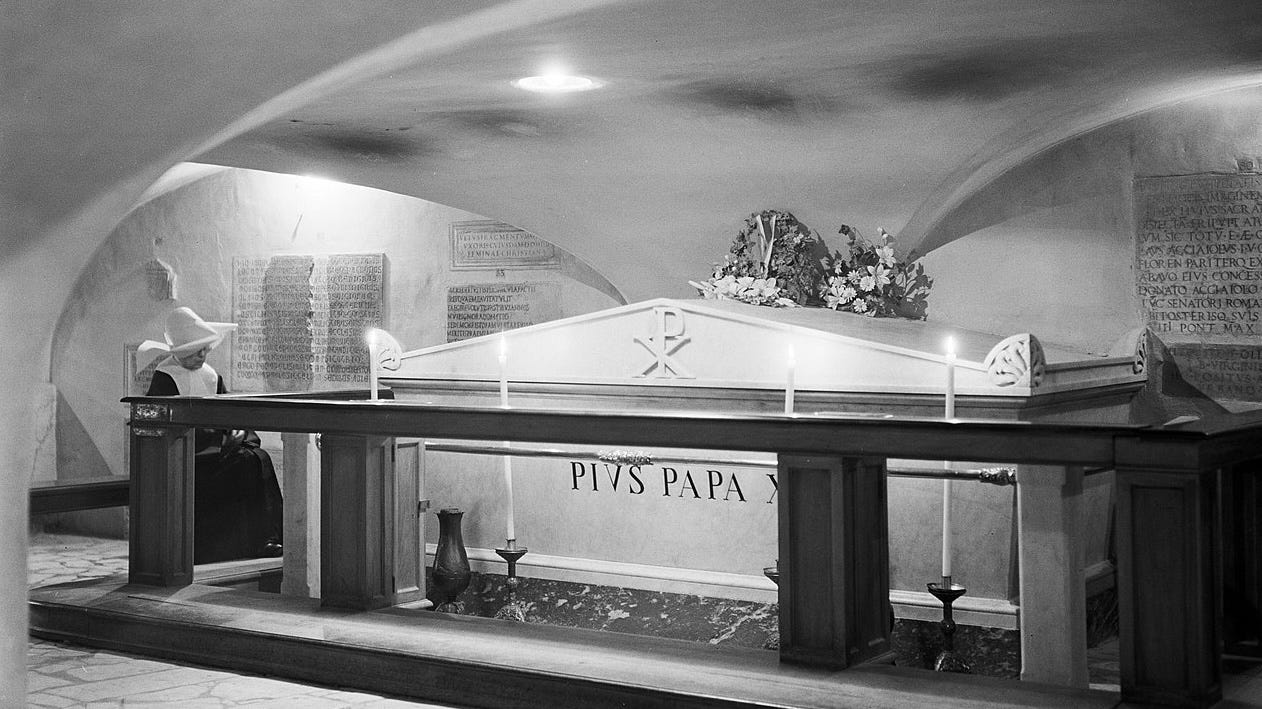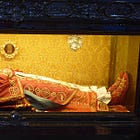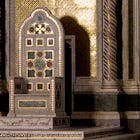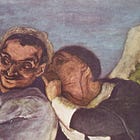How does a Pope stop being the Pope? Wernz & Vidal explain
Renowned canonists Wernz and Vidal tell us that a pope loses his office by dying, resigning, going mad or by lapsing into open heresy or schism – and give their understanding of the "doubtful pope."

Editor’s Notes
This is a translation of an extract from the classic (and enormous) commentary on canon law Wernz and Vidal (often called Wernz-Vidal).
Some comments and highlights:
Just as we illustrated in the satirical piece on The Spiritual Dangers of Susanvacantism, Wernz-Vidal show that there are factors which are simply incompatible with a man holding the papal office – and that this incompatibility has the effect of ending the superior-subject relationship automatically, with no need for ratification from anyone else. These include not only being a woman as in the case of “Pope Susan,” but also to:
Death
Insanity
Resignation
Heresy, and mutatis mutandis, schism.
Today, many are obsessed with the idea of declarations and dispositions of law - wrongly believing that something cannot become a legal fact without them. Wernz-Vidal are very clear in their opposition to this – especially in the final of these three examples:
“By heresy, notorious and openly divulged, the Roman Pontiff, should he fall into it, is likewise deprived of his jurisdictional power ipso facto, even before any declaratory sentence by the Church.”
“Moreover, a Pope who is publicly heretical, who by the command of Christ and the Apostles and due to the danger to the Church is to be avoided, must be deprived of his power – as nearly everyone admits. But he cannot be deprived of his power by a merely declaratory sentence.”
“Thus, it must be said that a heretical Roman Pontiff loses his power ipso facto. However, a declaratory sentence of the crime, which as merely declaratory should not be rejected, does not have the effect that the heretical Pope is judged, but rather is shown to have already been judged […]”
This text refers to the effect of “peaceful and universal adherence” of the Church as a means of ascertaining the legitimacy of a papal claimant. The authors’ treatment of this issue is brief, asserting one of two or three forms of the argument in passing, without developing the rationale or proofs required. This topic is addressed here:
One argument for the legitimacy of the post-conciliar papal claimants has been dubbed “mentevacantism” – namely, that these men have “mush minds” and so are incapable of realising that there is indeed an immutable truth, and that we cannot assent to truth and error at the same time. If this is not in itself an indirect accusation of heresy, it would seem to be a form of insanity, as Wernz-Vidal describe it.
Regarding the “doubtful pope” question, Wernz and Vidal appear primarily focus on the question of procedural problems in an election. We must observe third points here:
First, the general principles they lay down have wider implications, as is obvious to anyone who thinks about the matter.
Second, electing someone who is ineligible for the papacy is itself a procedural problem.
Third, an election must be accepted – and it is far from clear that one who accepts a vision of the papacy which is ordered in positive contradiction to the true definition can be said to have accepted his election (as opposed to something else). This is discussed here:
We could also note that those who want to deny that a pope loses office for open heresy or schism might as well also deny that he loses office when he dies. After all, as they say:
If the pope dies and nobody knows about it, does he retain office until someone finds him and issues a death certificate?
He might as well also say “Susan Is My Pope”:
Without further ado, here is the extract.
On the Cessation of the Power of the Roman Pontiff
From
Ius Canonicum – Tome II, De Personis
Francis Xavier Wernz SJ
Peter Vidal SJ
Third Edition, Rome, 1943. nn. 450–454
Part of the section on the “doubtful pope” has already appeared elsewhere (translator unverified).
The Death of the Pope
150. Upon death,1 the spiritual and civil power of the Roman Pontiff ceases. Although there is nothing preventing the civil power from being exercised by another subject during the vacancy of the Apostolic See, the ordinary spiritual power of the Roman Pontiff, like the ordinary power of a bishop, does not transfer to any chapter, as some commentators have falsely opined.2
Hence, the primacy of the Roman Pontiff’s spiritual jurisdiction, with only a moral – not physical – continuity, perpetually exists in the Church.3 However, since even during the vacancy of the Apostolic See the particular Church of Rome must be governed, and since the pontifical state cannot lack governance, and certain ecclesiastical matters of greater urgency, which cannot always be postponed without prejudice to the prerogatives of the Apostolic See, require prompt remedy; the Roman presbytery in the earliest centuries governed the Roman Church during the vacancy of the see.
From about the sixth century, this administration passed to the Archpriest, the Archdeacon, and the Primicerius of the notaries. Afterward, the Roman Pontiffs gradually appointed a Vicar, even a permanent one, to administer the Roman diocese; this Vicar General, usually chosen in perpetuity from among the cardinals, retains his office even during the vacancy of the Apostolic See. Should the Cardinal Vicar die during the vacancy, the Vicegerent succeeds him by disposition of the law.4
After acquiring civil sovereignty, the care of political governance, within the limits established by Pius IV and Clement XII, falls upon the Cardinal Camerlengo, who is assisted by the heads of the orders. Three days after the beginning of the conclave, these heads are succeeded by others, who in turn are succeeded by three more every three days, and so on in like manner.5
Furthermore, the jurisdiction of the Major Penitentiary does not cease with the death of the Roman Pontiff.6 Although the power of the Sacred Congregations is said to be suspended during the conclave, it is not entirely abolished. Therefore, congregations of cardinals can be held to address urgent matters, and in fact, they have been held.7
Nor is all power completely removed from the College of Cardinals.8 Thus, the governance of the universal Church, wherein bishops retain their ordinary jurisdiction – often augmented by extraordinary faculties – during the vacancy of the Apostolic See is sufficiently provided for.9
The Resignation of the Pope
451. By resignation, the Roman Pontiff clearly loses his jurisdiction. This pontifical jurisdiction does not depend on a physical and indelible character impressed upon the soul like the power of episcopal orders, but is a moral relationship between superior and subject, which depends on human will, easily changeable. Therefore, just as the Roman Pontiff attained the primacy of jurisdiction by freely accepting his election, so too he loses papal jurisdiction by freely and publicly resigning his dignity.
Moreover, what is permissible for other bishops – to resign their episcopal dignity for just causes, such as for the good of their souls or the needs or benefit of their churches – is all the more permissible for the Roman Pontiff for the needs or benefit of the universal Church. Certainly, a resignation by the Roman Pontiff without just cause would be valid, but it could not be called lawful; for so tight a bond should not be dissolved recklessly.10 However, the argument of a spiritual marriage between the Roman Pontiff and the Roman Church, which would make the bond indissoluble, cannot be pressed, as it is indubitably dissoluble by pontifical authority.
The acceptance of the Roman Pontiff's resignation is not required, since he has no superior on earth, and the spiritual bond should not degenerate into a bond of iniquity, from which the Roman Pontiff and the Church can only be freed by death. Finally, what Boniface VIII solemnly established and decreed regarding the resignation of his predecessor Celestine V – namely, “that the Roman Pontiff may freely resign: – he ratified again and included in his authentic collection for perpetual remembrance.11 This declaration, confirmed by the previous resignation of Celestine V (1294) and the subsequent example of Gregory XII,12 who likewise resigned, removed all dispute among canonists.13 Hence, the Code (Can. 221) merely declares what is already certain: the acceptance of the cardinals or others is not required for the validity of such a resignation.
The Insanity of the Roman Pontiff
452. By insanity, if the Roman Pontiff were to fall into it certainly and permanently, he would likewise lose his pontifical jurisdiction ipso facto, as theologians commonly hold, according to Tanner.14
For certain and perpetual insanity (not doubtful or transient) is equivalent to death, and by death, the Roman Pontiff certainly loses his jurisdiction. Furthermore, the basis for exercising papal jurisdiction is the habitual use of reason, which is entirely removed by certain and perpetual insanity. This is the reason why the election of an infant to the dignity of the pontificate is invalid by law; therefore, by parity, if a Pope were permanently reduced to the condition of an infant, his jurisdiction would cease ipso facto.
Moreover, papal power is not acquired by hereditary right but by canonical election due to personal qualities, nor can it be fully and perfectly exercised by a Vicar. Therefore, since all these qualities would no longer be relevant in the case of certain and perpetual insanity, for the peace and necessity of the Church, once the basis of habitual reason is destroyed in the Roman Pontiff, all jurisdiction is removed.
Open heresy on the part of the Pope
453. By heresy, notorious and openly divulged, the Roman Pontiff, should he fall into it, is likewise deprived of his jurisdictional power ipso facto, even before any declaratory sentence by the Church.15
On this matter, five opinions exist, of which the first denies the assumption of the entire question, namely, that the Pope, even as a private teacher, could fall into heresy. This opinion is certainly pious and probable,16 but it cannot be said to be certain and common.17 Hence, the question must be resolved, assuming the supposition is admitted.
Thus, a second opinion holds that the Roman Pontiff loses his power ipso facto even due to occult (hidden/secret) heresy. This opinion, according to Bellarmine, rightly labours under a false supposition, namely, that occult/secret heretics are entirely separated from the body of the Church.18
The third opinion holds that even for manifest heresy, the Roman Pontiff does not, by that fact alone, lose his power, nor can he be deposed. Bellarmine rightly calls this assertion "very improbable."
The fourth opinion, supported by Suarez,19 Cajetan, and others, contends that the Pope, even for manifest heresy, is not automatically deposed ipso facto, but can and should be deposed by at least a declaratory sentence of the crime. "This opinion," says Bellarmine, "in my judgment, cannot be defended."
Finally, there is the fifth opinion, which is that of Bellarmine himself, which was expressed at the beginning in the assertion, and is rightly defended as the most common by Tanner and others.20
For he who is no longer a member of the body of the Church, i.e., of the Church as a visible society, cannot be the head of the universal Church. But the Pope, who would fall into public heresy, would, by that very fact, cease to be a member of the Church; therefore, by that very fact, he would also cease to be the head of the Church.
Moreover, a Pope who is publicly heretical, who by the command of Christ and the Apostles and due to the danger to the Church is to be avoided, must be deprived of his power – as nearly everyone admits. But he cannot be deprived of his power by a merely declaratory sentence.
Indeed, every judicial sentence of deprivation presupposes a superior jurisdiction over the one against whom the sentence is pronounced. However, according to the adversaries' view, a general council does not have superior jurisdiction over a heretical Pope, for before the council's declaratory sentence, he retains his papal jurisdiction; therefore, the council cannot pronounce a declaratory sentence that deprives the Roman Pontiff of his power. Such a sentence would be one pronounced by an inferior against a true Roman Pontiff.21
Thus, it must be said that a heretical Roman Pontiff loses his power ipso facto. However, a declaratory sentence of the crime, which as merely declaratory should not be rejected, does not have the effect that the heretical Pope is judged, but rather is shown to have already been judged,22 i.e., the General Council declares the fact of the crime by which the Pope, through heresy, has separated himself from the Church and deprived himself of his dignity.
The absolute necessity of schism and heresy resulting in automatic loss of office
454. Scholium. The crime of schism is rightly considered equivalent to heresy. Aside from heresy, there is no crime for which the Roman Pontiff either loses his jurisdiction ipso facto or can be deposed by judicial sentence.
For a true and undisputed Pope to lose his jurisdiction ipso facto for any other crime, it would have to be either by a positive divine ordinance or by the nature of the matter. Such a positive divine ordinance does not exist, and by the nature of the matter, apart from the case of heresy, papal jurisdiction is not taken away. Even the most wicked Pope remains a member of the Church.
For a true and undisputed Pope to be deposed by judicial sentence, there would need to be an authority that, after examining the case, would pass a judicial sentence with real coercive power against him. However, the Roman Pontiff, by virtue of his primacy, cannot be judged by any human authority, but only by God.23 This principle, derived from the nature of the primacy, is confirmed by the tradition and practice of the Church.24 The entire tradition has consistently held to this principle: "The First See is judged by no one," as is evident from the cases of Symmachus and Paschal II.
Moreover, the Church has consistently denied that general councils, the College of Cardinals, or emperors have any right over the Pope, as shown in the case of Eugene IV. Likewise, Roman Pontiffs have never willingly submitted themselves to true coercive judgment but only to a judgment of discretion, as in the cases of Damasus, Symmachus, and Leo III.
There is also no parity between the election and deposition of a Roman Pontiff. In the former, the Pope is designated by the ministry of men; but it does not follow that the Pope can also be deposed by men. For by election, one becomes the Roman Pontiff; by deposition, authority is exercised that has in no way been given over him who is already, in fact, the Roman Pontiff. Therefore, even the deposition of a wicked Pope cannot be done either lawfully or validly.
However, just means against a wicked Pope, according to Suarez, include abundant assistance of divine grace, the singular protection of the guardian angel, the universal Church's prayer, secret or even public admonition, fraternal correction, just defence, whether by physical or moral force, and, if necessary, moral or even physical resistance.
Doubtful Popes
The ancient authors widely accepted the axiom: "A doubtful Pope is no Pope," applying it to resolve the difficulties arising from the Great Western Schism.25 This axiom admits of various interpretations: A doubtful Pope can be understood not negatively, but positively, i.e., after a diligent examination of the facts, the Church's leaders announce: "It is not certain that this Roman Pontiff's canonical election is valid."
Moreover, those words “no Pope” are not necessarily understood to refer to a Pope who has thus far been certain and undoubted and accepted by the entire Church, but about whose election difficulties later arise, so that he becomes a doubtful Pope, who for that reason would lose the pontifical power already obtained. Such an interpretation of the axiom seems to be condemned because the whole Church cannot fail regarding a legitimately elected Roman Pontiff due to the unity promised by Christ to His Church.
However, the other part of the axiom may have this meaning: that a Roman Pontiff whose canonical election is uncertain, and about whom, after thorough examination, solid and positive doubts remain, has never acquired papal jurisdiction from Christ the Lord.26 Therefore, bishops assembled in a general council, when they examine such a dubious case, do not judge the true Pope, as he lacks pontifical jurisdiction. If the axiom is understood in this latter sense, it seems to contain sound doctrine. This is primarily derived from the nature of jurisdiction.
For jurisdiction is essentially a relation between a superior who has the right to obedience and a subject who has the duty of obeying. Now when one of the parties to this relationship is wanting, the other necessarily ceases to exist also, as is plain from the nature of the relationship.
However, if a pope is truly and permanently doubtful, the duty of obedience cannot exist towards him on the part of any subject. For the law, “Obedience is owed to the legitimately-elected successor of St. Peter,” does not oblige if it is doubtful; and it most certainly is doubtful if the law has been doubtfully promulgated, for laws are instituted when they are promulgated, and without sufficient promulgation they lack a constitutive part, or essential condition.
But if the fact of the legitimate election of a particular successor of St. Peter is only doubtfully demonstrated, the promulgation is doubtful; hence that law is not duly and objectively constituted of its necessary parts, and it remains truly doubtful and therefore cannot impose any obligation.
Indeed it would be rash to obey such a man who had not proved his title in law. Nor could appeal be made to the principle of possession, for the case in question is that of a Roman pontiff who is not yet in peaceful possession. Consequently in such a person there would be no right of command – i.e. he would lack papal jurisdiction.
The same conclusion is confirmed on the basis of the visibility of the Church. For the visibility of the Church consists in the fact that she possesses such signs and identifying marks that, when moral diligence is used, she can be recognised and discerned, especially on the part of her legitimate officers. But in the supposition we are considering, the pope cannot be found even after diligent examination. The conclusion is therefore correct that such a doubtful pope is not the proper head of the visible Church instituted by Christ.
Lastly, a doubtful Pope contradicts the unity of the Church, as a perfectly separated body from its head. For a doubtful Pope has no right to command, and therefore the faithful are not obligated to obey; thus, the head would be perfectly separated from the rest of the Church's body.
Read Next:
HELP KEEP THE WM REVIEW ONLINE!
As we expand The WM Review we would like to keep providing free articles for everyone.
Our work takes a lot of time and effort to produce. If you have benefitted from it please do consider supporting us financially.
A subscription from you helps ensure that we can keep writing and sharing free material for all. Plus, you will get access to our exclusive members-only material.
(We make our members-only material freely available to clergy, priests and seminarians upon request. Please subscribe and reply to the email if this applies to you.)
Subscribe now to make sure you always receive our material. Thank you!
Follow on Twitter and Telegram:
152. What should be observed at the imminent death of the Roman Pontiff is explained more thoroughly by the Roman orders. For example, the Pope should be warned by a doctor about the danger of death, the Cardinals should be called so that the dying Pope may profess his faith before them, make a will, and choose a burial place. Otherwise, he is buried at St. Peter's with the usual solemnity.
Abuses that had crept in after the death of the Pope in ancient times, such as the looting of the papal palace, etc., were strictly prohibited by Apostolic Constitutions. See, for example, Camarda, l.c. in the appendix on the Constitutions and Chirograph of Clement XI.
Cf. Fagnanus, in c. 11, X de maior. et oboed. I, 33, n. 1 sq.; Saegmueller, D. Cardinäle p. 227 sq.
153. Palmieri l.c. p 521 sq. ; Franzelin, De Ecclesia p 226 sq.
154. Saegmueller, D. Cardinaele p 114 sq. ; Phillips, l.c. t. V, p 276 sq. ; Clem. XII, Const. “Apostolatus officium” 4 Oct 1732, § 17; Cit. Const, Pii X, n. 19.
155. Pii IV Const. “In eligendis” 9 Oct 1562 §§ 6-8; Clement XII Const. c.t. § 6-7; cit. Const. Pii X, n. 6.
156. Cap. 2 § 1, de elect. I.3, in Clem.; Pii IV Const. “In eligendis” §§9-10; Clem XII Const. cit. §§ 15-16; Benedict XIV Const. “In apostolicae” 13 Apr 1744 § 4; Ferraris, l.c. v. Cardinalis art. 5, n. 20 sq; cit Const. Pii X,, n. 16.
157. Fagnan., in cap. 11. X. de maior, et oboed, I. 33 n. 64 sq.; Ferraris, l.c. n. 43 sq.; Analect. Iur. Pont. A 1855, p 2372 sq.
158. Cap. 3 §1, de elect. I.6 in Sext.; Clem. XII cit. Const. §§ 6, 15, 18; Pii IV Const. “In eligendis” §6; cit. cap. 2 §1, de elect. In Clem.; cit Const. Pii X n. 1 sq., 6 sq.
Cf. Bouix, *De Curia Romana p. 130 sq.
159. Schmalzgr., l. I, t. 9, n. 13; Ph Hergenroether-Hollweck, l.c. n. 339; Gillamnn, in Arch f.k.K. t. 80, p 55 sq.
Cf. c. 1, de renunt. I, 7 in Sext.
160. Phillips, l.c. vol. I, § 31, where he excellently explains that Gregory XII restored peace and concord in the Church only through his legitimate and generous resignation. This doctrine, already defended by other writers (cf. Cardinal Hergenroether-Kirsch, Handb. d. allg. Kircheng. vol. II, p. 865 sq.), was later correctly followed by Cardinal Franzelin, De Ecclesia, p. 230 sq., although he does not explicitly name other supporters of his doctrine. See also Billot, l.c. vol. I, p. 626 sq.
161. In earlier times, Benedict IX (1033-1045) and Gregory VI (1045-1046) had truly resigned the papal dignity. However, these examples should not be too strongly emphasized, since the election and resignation of those Roman Pontiffs show many signs of human frailty. But what Hinschius, l.c. vol. I, 294 sq., says against the resignation of Gregory VI is not based on solid historical and canonical arguments. See Hefele, l.c. vol. IV, n. 706 sq.; Saegmueller, l.c. p. 141 sq., 230 sq.; Cardinal Hergenroether-Kirsch, l.c. vol. II, p. 218 sq., 583; differently Gillmann, l.c. p. 58 sq., where he thinks Gregory VI was deposed unwillingly at the Synod of Sutri (1046), not truly and freely resigning; but the deposition of a true Pope is invalid, just as a merely "pro forma" resignation by Gregory VI, as suspected by Gillmann, would not have produced a legal effect, i.e., a vacancy of the Apostolic See, unless the free consent of Gregory VI had truly occurred; consequently, the election of Gregory VI's successor would have been invalid, which is not generally questioned. If Hauck, Kircheng. Deutschl. vol. II, p. 589, denies the deposition and resignation of Gregory VI and defends that Gregory VI deposed himself, he holds a significant canonical absurdity.
Cf. Wilmers, De Christi Ecclesia p. 258.
162. Bellarmin., De Rom. Pont. l. II, cap. 30; Phillips, l.c. t. I, 31, i. I.; Bouix, De Papa, t. 11, p. 653 sq. 1a
163. Bellarmin., l.c. pr. et l. IV, cap. 6; Billot, l.c. t. I, p. 629 sq.
164. Innocent III, sermon IV on the consecration of a Pontiff: "The Pontiff can be judged by men or rather shown to be judged, if he evidently falls into heresy, because 'he who does not believe is already judged.'" However, the canons cited about a heretical Pope, such as c. 6, D. 40; c. 13, C. II, q. 7, are either apocryphal or of doubtful value. Cf. Phillips, l.c.
Cf. Palmieri, De Romano Pontifice p. 40.
Suarez, De fide disp. 10, sect. 6 n. 6.
165. Bellarmine, De Romano Pontifice book I, chapter 30, and also Bellarmine, De Conciliorum auctoritate book II, chapters 17, 18; Kober, De Depositione, p. 585 sq.; Wilmers, l.c. p. 258; Billot, l.c.
166. Therefore, Hinschius, l.c. vol. I, p. 308, errs in thinking that cases of heresy and schism are truly and properly exceptions to the general principle: "The First See is judged by no one," and without solid reason asserts that in those two cases, a general council does not merely issue a declaratory sentence but a true sentence of deprivation or deposition of the Roman Pontiff.
167. Cfr. Innoc. III, l.c.; c. 9, 10, D. 79; Bellarmin., De Rom. Pont. 1.I, cap. 30; Kober, l.c. p. 585.
168. Can. 1556 iunct. cap. 13, X. de iudic. II, 1; cap. 6, X. de elect. I, 6; Bellarmin., De auctor. Concil, cap. 17, 18, 19; Fagnan., in cap. 6, X. de elect, n. 21; Phillips, J. c. t. I, $ 31; Kober, 1. c. p. 549 sq.; Saegmueller, 1.c. p. 144 sq.; 233; Bouix, De Papa t. II, D. 623 sa., 629 sq.
169. If Hinschius, l.c. vol. I, D. 296 sq., argues against Catholics, e.g., Kober, l.c., that at least in ancient law the deposition of legitimate Roman Pontiffs was not disapproved (for there is no controversy about the current discipline and the deposition of intruders and usurpers, who were never Roman Pontiffs), he clearly confuses facts and usurpations with rights, the proper right of deposing rulers with the secular arm required by the Church, and a proper judgment with a judgment of discretion.
170. The application of this principle by Bellarmine and Suarez, among others, has been rightly contradicted by Ballerini, Phillips, Bauer, Cardinal Hergenroether, Cardinal Franzelin, De Ecclesia, p. 233 sq. See also Bouix, De Papa vol. II, p. 673 sq.
171. Cardinal Franzelin, l.c. p. 232 n. 4, final note; Camarda, l.c. p. 253 sq., 256 sq., where he discusses legitimate exceptions against an elected Roman Pontiff and rightly notes that an exception is not admitted against a Pope elected and accepted by the whole Church. That consensus of the Church is not an election, nor by its own power does it make the non-elected 'elected,' because a canonically elected Pope by the Cardinals is already a legitimate Pope before the Church's acceptance. Cf. Franzelin, l.c. p. 234.
Therefore, that acceptance by the Church is not the cause but a sign and effect of the infallible valid election. Conversely, if the whole Church abandons an elected Pope, e.g., Pedro de Luna (Benedict XIII), it is certain that it is a sign that he was never a legitimate Pope. Cf. Cardinal Hergenroether-Kirsch, l.c. vol. II, p. 867 sq.; Bouix, l.c. p. 684 sq.










There's a distinction and strong objection we sedevacantists have struggled to properly grasp
and that has caused us to not thoroughly and directly and sufficiently address the objection made by notable SSPX authorities as regards heresy and loss of office.
It's the important distinction between the real order and the legal order.
And this should illustrate the point:
"If the pope dies and nobody knows about it, does he retain office until someone finds him and issues a death certificate?"
Response:
1. In reality, he's not pope.
2. In the legal order, the office of the papacy is still not vacant until that fact of death has been legally established. Whatever the requirements in law are, or presumptions accepted by law, must be followed.
3. Cry out all you want that you are certain that the pope is dead, you CANNOT OBLIGE the entire Catholic world to cease mentioning his name in the Canon of the Mass and other prayers until his death is legally established.
4. Cry out all you want that you are certain that the pope is dead, you cannot accuse anyone of sin for merely refusing to acknowledge your testimony that the pope is dead. Every priest LICITLY mentions the pope's name at Mass until the pope's death is formally established.
5. If you are certain of his death, you are probably OBLIGED to act according to that certitude. I say "probably" because I'm not certain how the rules in Moral Theology on acting according to one's properly formed conscience apply here.
=======
Substitute a dead pope above for an "UNDECLARED manifest formal heretic" and the same conclusions apply.
1. In reality, the undeclared formal heretic is not pope IF AND ONLY IF it is true that a manifestly heretical pope ipso facto loses office. I say "IF" because there's no definitive judgment of the Church on this, YET. I, like many, personally believes this most certainly the correct OPINION.
2. In the legal order, the office of the papacy is still not vacant UNTIL AT LEAST a declaratory sentence.
3. Cry out all you want that you are certain that the pope is a manifest heretic, you cannot oblige the entire Catholic world to cease mentioning his name in the Canon of the Mass and other prayers until the pertinacity of his heresy and the attendant consequences are LEGALLY established and consequently bind all Catholics to act accordinly.
4. Cry out all you want that you are certain that the pope is a manifest heretic, you cannot accuse anyone of sin for merely refusing to acknowledge your conclusion that the pope is a manifest heretic, for they can rightly or wrongly argue extenuating circumstances that remove presumption of pertinacity, and also PERSONALLY, rightly or wrongly, come to the conclusion that he's no formal heretic. Every priest licitly mentions the pope's name at Mass UNTIL the pope's manifest heresy and loss of office is formally legally established.
5. If you are certain of his manifest heresy, you are propably OBLIGED to act according to that certitude. I say "probably" because I'm not certain how the rules in Moral Theology on acting according to one's properly formed conscience apply here.
=======
This is the SSPX's best objection and it is an excellent one that should not be answered by rehashing arguments based on answers to questions that HAVE NOT YET BEEN definitively settled by the Church. Even though the answers are MOST PROBABLE, they are still not obligatory.
All of this is common sense, when subjectivism is replaced with the objective lens.